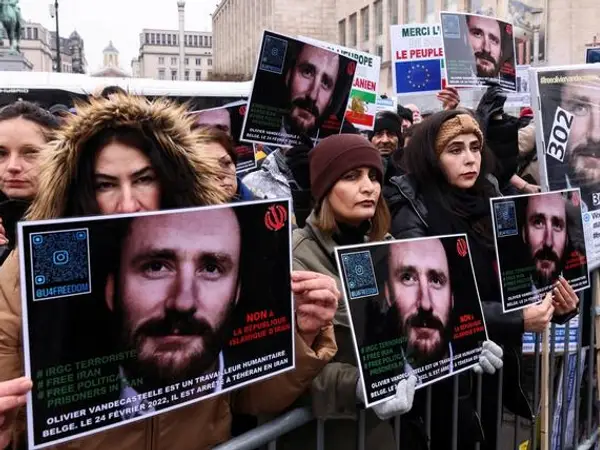Oman has mediated a long-debated prisoner swap deal between Iran and Belgium to release a convicted Iranian diplomat for a Belgian aid worker taken hostage by Tehran.
Oman’s foreign ministry released a statement on Friday that reads “In compliance with the directives of His Majesty Sultan Haitham bin Tarik, to fulfill the requests of the Iranian and Belgian governments to assist in resolving the issue of detained citizens in both countries, the Omani efforts have resulted in an agreement between the two sides for a mutual exchange deal.”
Without naming the prisoners, the ministry added that the individuals who were released have been transported from Tehran and Brussels to Muscat today, Friday, May 26, 2023, in preparation for their return to their respective countries.
Former diplomat Asadollah Assadi, convicted in plot to bomb an Iranian exiled group event in France, arrived in Tehran on Friday afternoon. Upon arrival, he received a hero's welcome by government spokesman Ali Bahadori Jahromi and Kazem Gharibabadi, the deputy head of the Judiciary who is also secretary of the High Council for Human Rights as well as several other officials.
Earlier in the day, Belgian Prime Minister Alexander De Croo announced in a statement that aid worker Olivier Vandecasteele had been freed and will arrive in Brussels within a few hours.
De Croosaid in a video statement, "If everything goes as planned, he will be with us tonight, finally free," adding that he had undergone medical assessment and was in the care of Belgian military and diplomatic staff.
“Olivier spent 455 days in prison in Tehran. In unbearable conditions. Innocent,” De Croo said, adding: “Olivier Vandecasteele’s return to Belgium is a relief. A relief for his family, friends and colleagues.”
Thanking the Sultanate of Oman for “its positive efforts in this direction,” Iran’s foreign minister Hossein Amir-Abdollahian said in a Persian post on his Twitter account that “Mr. Assadollah Assadi, the innocent diplomat of our country, who was illegally detained in Germany and Belgium for more than two years against international law, is now on his way back to his homeland and will soon enter our beloved Iran.”
Assadi, 50, a former attaché at the Iranian embassy in Austria, was convicted of plotting to bomb a gathering of the exiled opposition group Mujahedin-e Khalq Organization (MEK) near Paris on June 30, 2018. The only Iranian diplomat ever brought to trial in Europe for direct involvement in terrorism was arrested in Germany, where he did not enjoy diplomatic immunity, while he was on holiday. German authorities later extradited Assadi to Belgium.
Iran's Foreign Ministry Spokesman Nasser Kanani issued a statement, saying that Assadi will return to the country after "five years in captivity," claiming that Assadi had been "taken hostage" during a plot designed by the Israeli regime and cooperation of some European intelligence services.
"The Zionist-American 'big lie' scenario went on stage with the aim of creating a crisis in relations between Iran and Europe and this plot happened right after the US withdrew from the nuclear deal with Iran," he said.
However, the Islamic Republic has a long history of hostage diplomacy, which started soon after the establishment of the regime with taking hostage American diplomats and embassy staff. UN experts and international human rights organizations say that the Islamic Republic takes foreigners hostage to extract concessions from the West.
The Islamic Republic’s judiciary sentenced Vandecasteele, who was detained in 2022, to 40 years in prison and 74 lashes for alleged “spying and cooperation with the United States, money laundering and smuggling $500,000 out of Iran.”
Vandecasteele, now 42, has served in various international humanitarian organizations since at least 2006, including, Médecins du Monde, Norwegian Refugee Council (NRC), and Relief International. He worked in Iran for humanitarian organizations for more than six years and left the country. Later, he was lured back in a honey trap plot and was detained in February 2022.
The Belgian Parliament ratified a controversial prisoner swap treaty with Iran on July 20, but a temporary ban on the extradition of the convicted diplomat was announced by the Brussels Court of Appeal late in July following numerous complaints. The critics of the accord warned that such a treaty would effectively establish Belgium as a “sanctuary country” for terrorist operations, and a haven for Iranian intelligence services to maintain a European command center.
In March, Belgium's Constitutional Court rejected a request to annul a prisoner exchange treaty with the Islamic Republic paving the ground for the release of the diplomat.
